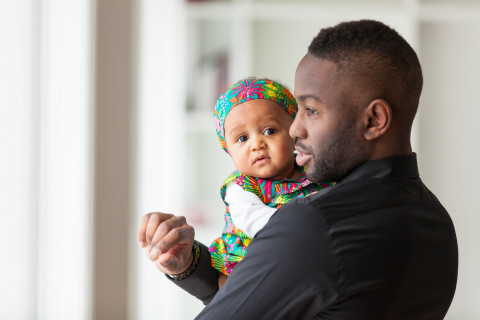Doctoral defence of Mathias Ebot, M.Soc.Sc, 16.12.2022: Christian religious values are the framework for living in Finnish-African Families
The doctoral dissertation in the field of Sociology will be examined at the faculty of Business and Social Sciences at Joensuu.
What is the topic of your doctoral research? Why is it important to study the topic?
My doctoral thesis is a sociological exploration of family life, titled, Fatherhood and Fathering in Finnish-African Families: The Experiences of African Fathers. The study is timely and a welcome contribution to the sociology of family life, specifically fatherhood and fathering, and thus, opens new perspectives to Finnish family scholarship and offers this scholarship a way to be inclusive in overcoming one of its most significant limitations.
What are the key findings or observations of your doctoral research?
Religiosity was of utmost importance to the families studied. Christian religious values are the framework for living – as it pertains to the upbringing of the children, guiding their moral choices, shaping, and framing daily family activities. What this observation points to is that religiosity between parents and religiously informed socialization practices and expectations for children are good frameworks for living, with morals that can be permeable across ‘racial’ and cultural norms. To some extent, therefore, this finding implies that maintaining religious values and framing in daily family living helps transcend boundaries that may strengthen unity and is upbeat to the studied Finnish-African parents.
Further, the study has the highest number of black Africa-born men as fathers in a parenting relationship with white Finnish-born women as mothers participating in a qualitative sociological family study across eight towns in Finland. The data gathering process is also the largest and most extensive among Finnish-African families and parents carried out for the purpose of a doctoral dissertation in contemporary Finland. Ten countries of sub-Saharan Africa are represented, resulting in the scheduling of joint interviews with 27 couples in their homes and individual interviews with 15 single individual male or female parents in eight Finnish metropolitan university towns – what I refer to (heuristically) as Finnish Metropolis.
One of my findings has certainly been triggered by a written phrase on my journal entries, ‘no pets identified’. Dogs or cats were certainly marginal in terms of their presence in the everyday family lives of the studied parents. At the same time when an estimation of 0.6 million dogs is present in the population of about 6 million inhabitants – equating to one dog with every five-households.
Another finding was, how the Africa-born fathers have marked their children by bestowing them with African cultural names. Mind you, ten countries of sub-Saharan Africa are represented. And these names fulfill many functions that cannot be explicitly illustrated here. Nevertheless, African names are often given as labels and entitlements, as symbol or remembrance, for display, as a process of documenting, for proclamation of one’s space within the family, to mark testimony of African and family roots and maintenance.
How can the results of your doctoral research be utilised in practice?
The understanding I offer with this doctoral research is practical in that racism and racists can be present in families. But familial, societal and institutional support can be mobilized in or as a response to this problem to help Finnish-African parents and their children. Doing the research for this dissertation has also taught me more about solidarity and diversity, as well as the possibility of having staff of diverse backgrounds in the many agencies, institutions and family support programs that are now only staffed by mostly white Finnish-born persons.
This dissertation has also been written from an experience that when state officials in social and family institutions look like the phenotypically and culturally diverse clients they serve and have sufficient multicultural impulse and mindset, many Africa-born fathers or parents may start to use formal institutions for certain guidance or support enthusiastically. Thus, diversity work and inclusion in the workplace that recruit men or women of color, black Africa-born people into early childhood education and family services could create versatile networks that are often behind work positions and occupations of institutions and thus, tend to be upbeat in terms of effective multicultural policy and practice.
What are the key research methods and materials used in your doctoral research?
Joint and single interviews and observations across the homes of Finnish-African families were carried out, with many photographs taken as observational cues. Epistemological shifts were also possible at various levels. For example, through the recognition of interview narratives as a form of family practice and as family display in a particular context. Bear in mind too that family display in this context can also be assessed as a form of 'family talk' between family members, especially in the presence of an audience that they may want to achieve familial legitimacy and acceptance.
Finally, the analysis followed a multi-layered close reading of the data for open codes and the extraction of emerging themes. It seemed obvious that what these careful readings and coding of the ways participants talked about the doing, displaying, and documenting of their family life and family practices between themselves and to me helped not only in identifying and assigning crucial words or phrase of sociological importance. But also, in developing a deeper understanding of participants’ experiences, positions and socialization pathways.
The doctoral dissertation of Mathias Ebot, M.Soc.Sc, entitled Fatherhood and Fathering in Finnish-African Families: The Experiences of African Fathers, will be examined at the faculty of Business and Social Sciences on 16.12.2022 at 12 noon online. The Opponent will be Docent Petteri Eerola, University of Tampere, and the Custos will be Professor Emerita Leena Koski, University of Eastern Finland. Language of the dissertation event is English. Public examination will be streamed live.
For further information, please contact
mathias.ebot(at)uef.fi
